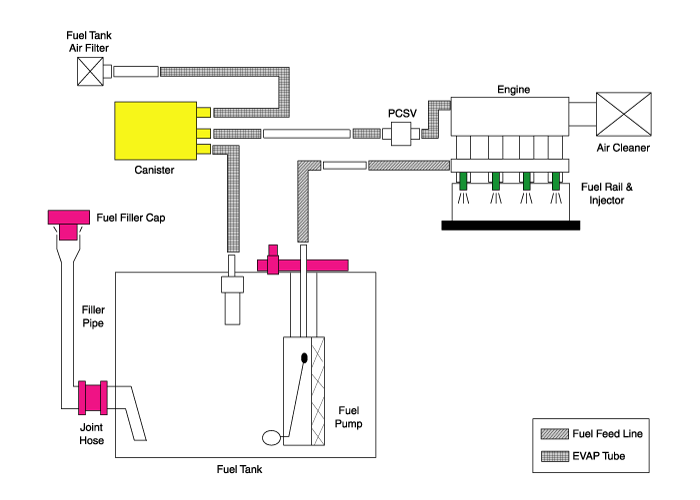Hyundai Kona: Evaporative Emission Control System / Schematic diagrams
Hyundai Kona (OS) 2018-2026 Service Manual / Emission Control System / Evaporative Emission Control System / Schematic diagrams
| Schematic Diagram |

Canister
The Canister is filled with charcoal and absorbs evaporated fuel vapor from
the fuel tank. The gathered fuel vapor in canister is drawn into the intake
manifold by the ECM/PCM when appropriate conditions are set.
Purge Control Solenoid Valve (PCSV)
The Purge Control Solenoid Valve (PCSV) is installed in the passage connecting
the canister to the intake manifold. It is a duty type solenoid valve and is
operated by ECM/PCM signal.
To draw the absorbed vapor into the intake manifold, the ECM/PCM will open the
PCSV, otherwise the passage remains closed.
Fuel Filler Cap
A ratchet tightening device in the threaded fuel filler cap reduces the chances
of incorrect installation, when sealing the fuel filler. After the gasket on
the fuel filler cap and the fill neck flange make contact, the ratchet produces
a loud clicking noise indicating the seal has been set.
 Description and operation
Description and operation
Description
The Evaporative Emission Control System prevents fuel vapor stored in fuel tank
from vaporizing into the atmosphere. When the fuel evaporates in the fuel tank,
the va ...
 Repair procedures
Repair procedures
Inspection
[System Inspection]
1.
Disconnect the vapor hose from the intake manifold and connect a vacuum
pump to the nipple on the intake manifold.
...
Other information:
Hyundai Kona (OS) 2018-2026 Service Manual: SRSCM Components and components location
Components
1. Front right Pressure Impact
Sensor (FIS)
2. Supplemental Restraint System Control Module (SRSCM)
3. Front left Pressure Impact Sensor (FIS)
4. Pressure Side Impact Sensor
(P-SIS
5. Gravity Side Impact Sensor (G-SIS)
...
Hyundai Kona (OS) 2018-2026 Service Manual: Repair procedures
Replacement
[Removal]
ãÂ
Put on gloves to prevent hand injuries.
ãÂ
...
ôˋ 2018-2026 www.hkona.com
